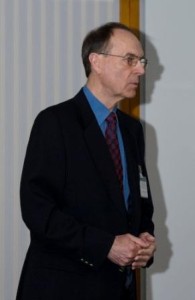
Back in the 90s, key people at BP had been thinking for some time about the value of having a plug and play standard for process simulation. Peter decided that the FOCAPD (Foundations of Computer-Aided Process Design) conference would be a good place to discuss this concept with the process simulation community. He therefore attended the FOCAPD event organized in July 1994 at Snowmass, Colorado. Unfortunately, the concept of a plug and play standard didn’t raise much interest at that time. However, it did raise just enough, with Hans-Horst Mayer giving strong support from BASF.
In early 1995, two different initiatives (OO-CAPE for Object Oriented CAPE and OS-CAPE for Open Standards CAPE) brought together several industrial parties, in which Peter led the BP input. These projects paved the way to the CAPE-OPEN project itself, after BP got support from the EU project PRIMA to submit a plug and play proposal to the EU’s Framework IV. PRIMA, an initiative to enhance the effectiveness of information technology for the European process industries, was targeted at launching a number of collaborative research projects and assembled a large number of industrial companies, including end-user organizations for process simulation software. CAPE-OPEN was approved for funding by EU through this scheme.
Peter then actively participated in the CAPE-OPEN project from January 1, 1997 till June 30, 1999. He led the work package dedicated to the development of the Unit Operation interface specification and served on the project steering committee along with representatives from IFP, BASF, ICI, Du Pont, Bayer and ELF. While not present at the CAPE-OPEN demonstration session in Budapest (May 31 – June 2, 1999) , he was key to the success of that event showing interoperability through CAPE-OPEN interfaces, by leading the design of the Unit Operation interface specification. We should remember that CAPE-OPEN went through several critical times where it was not easy to figure out if specifications would be delivered in time. Peter’s consideration for others was vital in smoothing out many difficult situations.Peter then went on with the Global CAPE-OPEN (GCO) project from July 1, 1999. His role was once more both technical and management. Peter was the leader of Work Package 4 (WP4) targeted at the integration of open simulation in the work process. He was key to the formation in March 2001 of the Interoperability Task Force (ITF) within WP4 and its subsequent success. The ITF was charged with facilitating the delivery of practical plug and play interoperability within commercial flowsheet simulators, via industrially relevant test scenarios, and the critical review of the CAPE-OPEN interface specifications for ambiguities and omissions. Peter specifically delivered the interoperability scenarios to be tested. The people and organizations involved in the ITF will remember the striving atmosphere of the meetings held by this Task Force where Peter kept things going smoothly whatever the difficulties encountered.
The numerous phone and physical meetings of the GCO project management committee created links between its members and everyone has vivid recollections of the role taken by Peter in these meetings. Peter played perfect host to several of these in Sunbury. Peter continued his support of CAPE-OPEN through the GCO Support project, participating in the CO Tour days organized within this project. He brought to these his professional background of supervising modeling work at BP.
Following the formation of CO-LaN as a not-for-profit organization maintaining and developing the CAPE-OPEN standards, Peter served as the Secretary until the end of 2007, even after his retirement from BP. The minutes he wrote for all the Management Board meetings will long be remembered as accurate and to the point! He was also instrumental in developing the CAPE-OPEN Logging and Testing Tool (COLTT), which remains still a key deliverable from CO-LaN as an aid to developers and end-users. The ITF initiative of Global CAPE-OPEN was kept alive in CO-LaN through Peter.
After standing down from his roles within CO-LaN at the end of 2007, the CAPE-OPEN Award 2007 was presented to Peter BANKS for being a champion of process simulation interoperability and his dedication to the CAPE-OPEN standards since 1995.
Peter created the starting point for CAPE-OPEN and has followed all the subsequent steps towards the industry-wide recognition of CAPE-OPEN. He will be deeply missed by all involved in CAPE-OPEN. The Members of CO-LaN express their deepest gratitude to Peter for his long-standing backing of CAPE-OPEN, and we offer our sympathy to his family.
